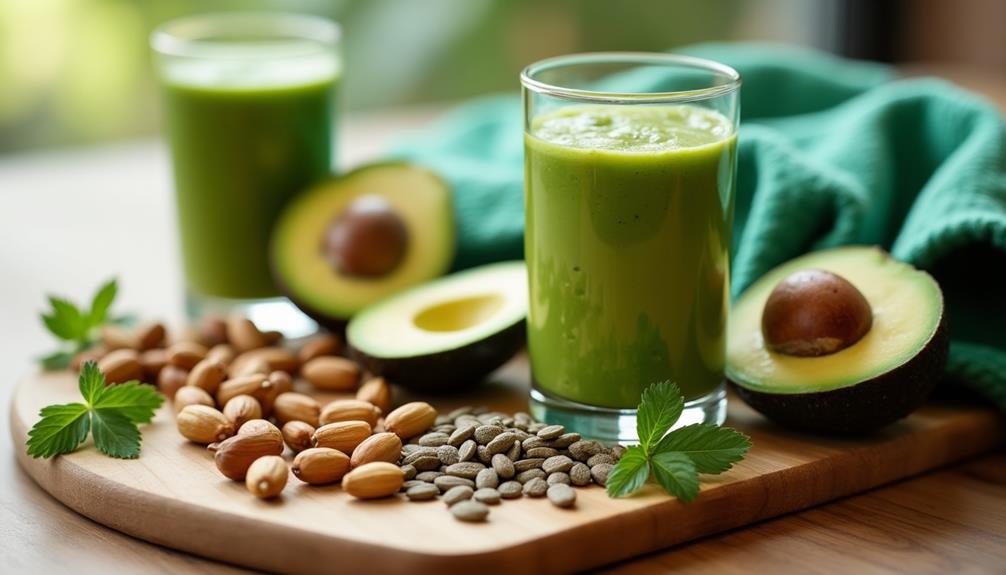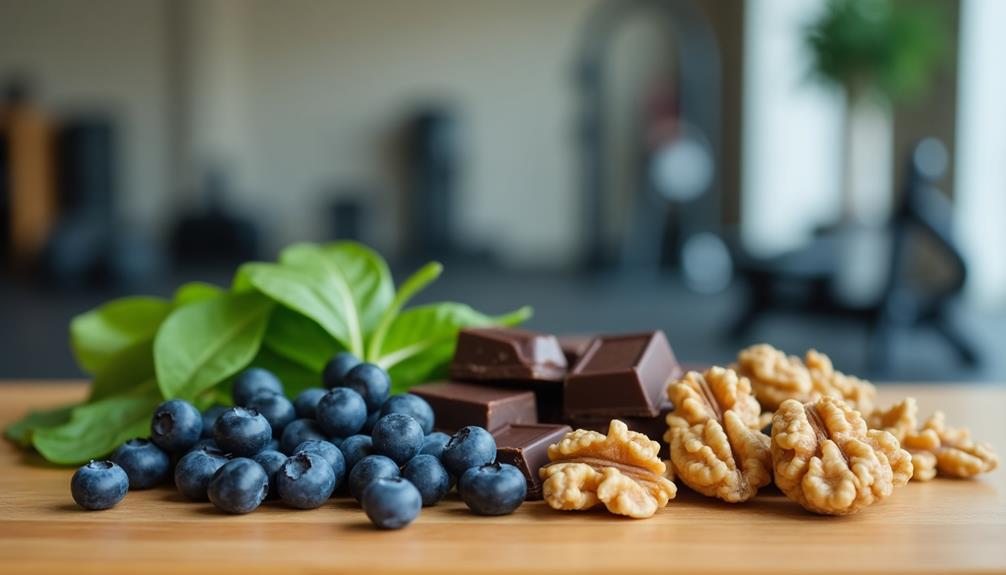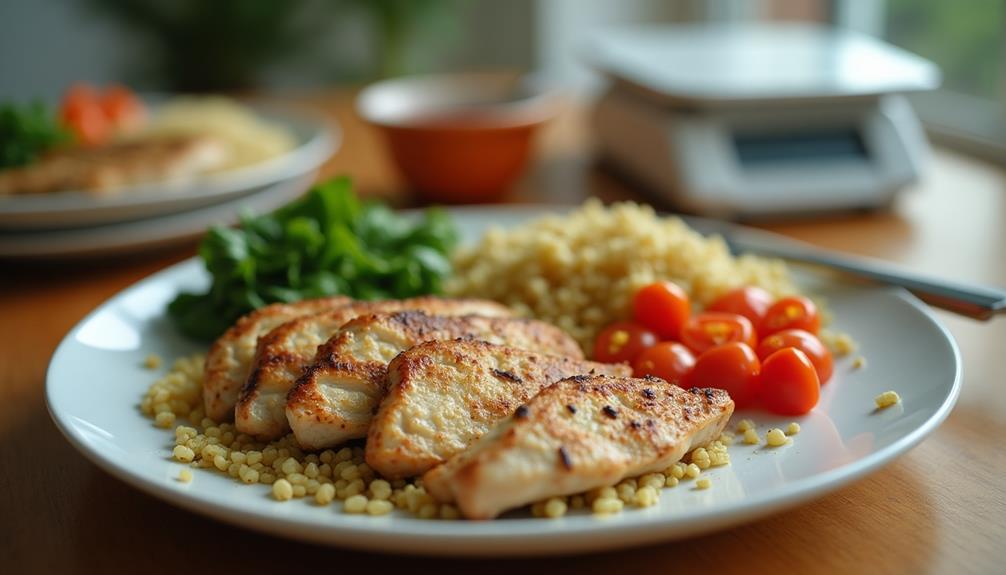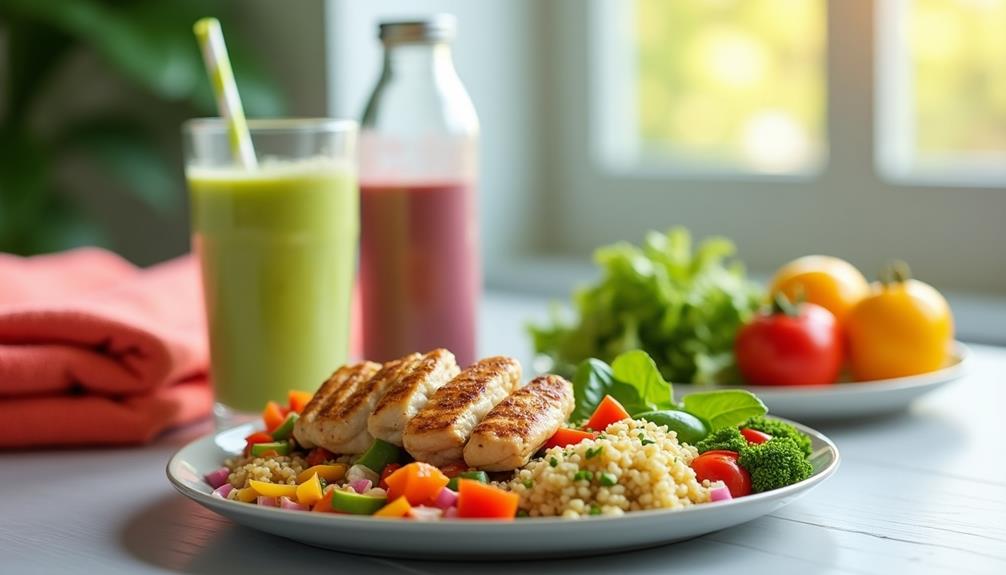To enhance your post-workout nutrition, start by prioritizing protein intake; aim for 20 to 30 grams within 30 minutes. Don't forget to replenish carbohydrates, focusing on easily digestible options like bananas or rice cakes, with a 3:1 carb to protein ratio. Staying hydrated is essential, so drink water or consider electrolyte drinks. Incorporate healthy fats like avocados or nuts in your meals, as they support muscle repair. Timing is key; pair protein with carbs and opt for whole foods. To end, listen to your body and adjust based on your needs. More insights await you on effective recovery strategies!
Core Insights
- Consume 20 to 30 grams of protein within 30 minutes post-workout to aid muscle repair and growth.
- Replenish glycogen with easily digestible carbohydrates, maintaining a 3:1 carb-to-protein ratio.
- Stay hydrated by drinking water or electrolyte drinks immediately after exercise to support recovery.
- Incorporate healthy fats like avocados and nuts in your post-workout meal for optimal recovery and inflammation reduction.
- Opt for whole foods over processed options to enhance nutrient absorption and overall recovery quality.
Prioritize Protein Intake

After a tough workout, prioritizing protein intake is necessary for your recovery and muscle growth. Protein plays an essential role in repairing muscle fibers that break down during exercise. Aim to consume a source of protein within 30 minutes post-workout. This could be a protein shake, yogurt, or lean meat. Whey protein powders are particularly effective for lean muscle growth, offering high protein content and excellent mixability. Look for options with complete amino acid profiles to support muscle protein synthesis.
Depending on your workout intensity and goals, you should aim for 20 to 30 grams of protein. This amount helps stimulate muscle protein synthesis, which is crucial for recovery.
Incorporating a variety of protein sources, such as eggs, fish, and legumes, can enhance your nutrient intake. Remember, consistency is key. Regularly prioritizing protein after workouts will support your body's recovery and performance in the long run.
Replenish Carbohydrates

Opt for easily digestible options, like bananas, rice cakes, or a smoothie. These foods quickly replenish glycogen and help your muscles recover. A good rule of thumb is to consume a 3:1 ratio of carbohydrates to protein, which supports muscle repair while replenishing energy. For faster absorption, consider using fast-acting carb powders that are specifically designed for post-workout recovery and easy digestion.
Listen to your body; if you feel fatigued or sluggish, you may need more carbs. By prioritizing carbohydrate intake after exercise, you'll enhance your recovery and be ready for your next workout.
Stay Hydrated

Start by drinking water immediately after your workout. Aim for at least 16-24 ounces to kick off the rehydration process. If your workout was particularly intense or prolonged, consider a sports drink that contains electrolytes. These help restore the balance of sodium and potassium in your body, essential for muscle function. For a natural alternative, coconut water brands like Zico or CoAqua offer high potassium content and minimal added sugars, making them excellent choices for post-workout hydration.
Keep an eye on your urine color; light yellow indicates adequate hydration. Remember to sip water throughout the day, not just after workouts. Staying hydrated enhances performance and supports overall recovery, so make it a priority in your routine.
Incorporate Healthy Fats

Including healthy fats in your post-workout meal can greatly enhance recovery and provide essential nutrients. Healthy fats, like avocados, nuts, and olive oil, play a pivotal role in supporting muscle repair and reducing inflammation. They also help your body absorb fat-soluble vitamins, such as A, D, E, and K.
When you combine healthy fats with carbohydrates and protein, you create a balanced meal that fuels your body effectively. Aim for a portion of healthy fats about the size of your thumb. This helps you stay satisfied without overloading on calories.
Consider adding a handful of almonds to your smoothie or drizzling olive oil over your grilled chicken. These simple additions can make a significant impact on your recovery journey.
Timing Is Key

Here are three key tips to keep in mind:
- Prioritize Protein: Incorporate protein-rich foods to help repair muscle fibers and promote growth.
- Include Carbohydrates: Pair your protein with some carbs to replenish glycogen stores and restore energy levels.
- Stay Hydrated: Don't forget to drink water or a low-sugar electrolyte drink to rehydrate after your workout.
Choose Whole Foods

Why settle for processed foods when whole foods offer so much more for your post-workout recovery? Whole foods, like fruits, vegetables, lean proteins, and whole grains, provide essential nutrients that help your body heal and rebuild. They're loaded with vitamins, minerals, and fiber, which support digestion and overall health.
Instead of reaching for sugary snacks or convenience meals, think about incorporating options like grilled chicken, quinoa, or a smoothie made with spinach and bananas. These choices will not only fuel your recovery but also keep you satisfied longer.
Include Antioxidant-Rich Foods

- Berries: Blueberries, strawberries, and raspberries are loaded with antioxidants. They're delicious in smoothies or as a topping for yogurt.
- Dark Chocolate: A small piece of dark chocolate can satisfy your sweet tooth while providing powerful antioxidants. Choose varieties with at least 70% cocoa.
- Spinach: This leafy green is rich in vitamins and minerals. Toss it into a salad or blend it into a smoothie for an extra nutrient boost.
Make these foods a staple in your post-workout meals!
Monitor Portion Sizes

Monitoring portion sizes is crucial for maximizing the benefits of your post-workout nutrition. After exercising, your body needs the right amount of nutrients to recover effectively. Start by understanding your individual needs based on your workout intensity and goals. Use a food scale or measuring cups to ensure accuracy.
Pay attention to serving sizes on nutrition labels, and don't be afraid to adjust based on your hunger levels. It's easy to overestimate how much you need, especially after a tough workout.
Aim for a balanced plate, including protein, carbohydrates, and healthy fats. This approach helps prevent overeating and supports peak recovery. By keeping portions in check, you'll fuel your body effectively and reach your fitness goals.
Consider Supplements

- Protein Powder: A convenient way to boost your protein intake, aiding muscle repair and growth.
- Branched-Chain Amino Acids (BCAAs): These can help reduce muscle soreness and improve recovery time after intense workouts.
- Electrolyte Drinks: Replenishing lost electrolytes is essential for hydration and maintaining performance, especially after long or intense sessions.
Choosing the right supplements can enhance your recovery, making your post-workout nutrition even more effective. Always consult a healthcare professional before starting any new supplement regimen.
Listen to Your Body

After a tough workout, your body often sends signals that can guide your post-exercise nutrition. Pay attention to how you feel. If you're fatigued and shaky, your body might need carbohydrates for energy replenishment. Cravings for protein can indicate that your muscles need repair. Don't ignore hunger cues; they're your body's way of asking for nutrients.
Hydration is equally important. If you're thirsty, drink water or an electrolyte-rich beverage to recover better. Listen to your body's signals, and respond to them with balanced meals that include proteins, healthy fats, and carbs. This way, you'll support recovery and enhance your performance for future workouts. Trust your instincts, and let your body guide your nutrition choices after exercising.
Frequently Asked Questions
Can I Eat Junk Food After a Workout?
After a tough workout, it's tempting to indulge in junk food. While it won't ruin your efforts entirely, you're better off choosing nutritious options that fuel recovery and enhance your progress toward goals.
How Long Should I Wait to Eat After Exercising?
You should aim to eat within 30 to 60 minutes after exercising. This window helps replenish your body's energy stores and kickstarts recovery, ensuring you get the most benefits from your workout. Don't skip it!
Are Plant-Based Proteins as Effective as Animal Proteins?
When it comes to protein sources, both plant-based and animal proteins hold their own merits. You'll find plant proteins can effectively support your needs, just like their animal counterparts, given proper variety and balance in your diet.
What Snacks Are Best for Post-Workout Recovery?
After your workout, grab snacks rich in protein and carbs, like Greek yogurt with fruit, a protein shake, or nut butter on whole-grain toast. These choices help replenish energy and support muscle recovery effectively.
How Do I Know if I'm Overdoing My Nutrition?
You'll know you're overdoing your nutrition if you feel sluggish, gain unexpected weight, or experience digestive issues. Listen to your body's signals, adjust portions, and make sure you're eating balanced meals to maintain peak energy and health.

